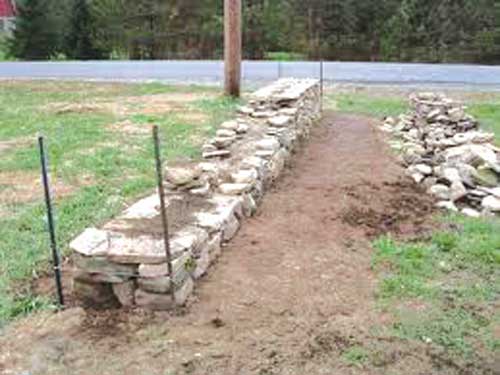.jpg)
Recently, in Teaneck, a newly constructed stone wall fell between two properties. The Steins had spent months working with an engineer, a landscaper, and getting permits from the Township, but the wall didn’t last very long due to a defect in some prior workmanship. It bulged and bucked, and was flush against the neighbor’s fence, without causing any damage. A landscaper was hired to repair the wall, to painstakingly replace each brick and dig up a new foundation, but he was set on receiving the neighbor’s permission before making this effort, as he would have to infringe on their property. They met, and he promised to replace everything as it had been, prior to the wall collapsing. Everyone seemed content.
But then, an inspector from the Township of Teaneck showed up at the Stein’s home. “Your neighbor called us to report a collapsed wall,” he said, pointing to the house next door. “I don’t see any problems… it looks like the work is already underway.” Mrs. Stein cringed. It was not the first time a fellow Jew felt the need to go to an official for something that could have been (and was being) resolved between them. There were always mumblings in the office of how they didn’t understand why the Jews all reported each other—and why they all showed up to complain about neighbors applying for variances.
The Steins felt somewhat betrayed by the neighbor, feeling that he felt he had to go behind their backs. The wall was already being rebuilt, fences were being erected. They would each have their coveted space back. And yet, it wasn’t enough to placate anyone.
But then the most tragic thing of all happened. There was a knock at the Stein’s door, and it was the landscaper, standing there, raking his hand through his thick hair. “It’s all under control,” he said, gesturing to the workers outside, “but I don’t understand how much you Jewish people fight. You fight even more than the gentiles. You go behind each other’s backs. And you would think, after all you’ve been through, after surviving the Holocaust, that you would stand by each other.” His eyes spoke his sadness, and he looked at the ground. He wasn’t even a Jew, and yet, he felt our pain.
That night, it was Shabbat, and while Mr. Stein was in shul, Mrs. Stein allowed the landscaper’s words to pierce through her skin, until she felt uncomfortable and wanted to escape, but didn’t know how. She sat outside on the balcony, overlooking the upturned earth, the pile of fresh stones, the makings for a new, sturdy wall, and felt a suffocating squeeze in her throat. She glanced over at her neighbor’s home, wondering if they felt peace from the lighting of their Shabbat candles, wondering if they even had any inkling of how their simple act of tale-bearing over a broken wall could birth so many negative thoughts about Jewish people. Could create so much Chilul Hashem. She cried until her husband came home from shul, and found her there, and said, “My darling, what is it that pains you?”
“There are people among us who mock the Jews. My heart hurts because we have failed our God.”
Mr. Stein comforted his wife, gave her sips of wine at Kiddush and tried to cheer her up. They thought of hypothetical ways they could exact revenge, but knew that the source of their frustration was more in the desecration of the Jewish people that was set into motion, and there was no way to combat that. No way, except to create more awareness.
We don’t need to look at the tale of Kamtzah and Bar Kamtzah to understand the damage “being an informant” can do. We can actually look at our own community, and our own actions. Although we don’t have a Beit Hamikdash that can be destroyed, and we are already in exile, it may seem like we don’t have as much at stake, as much to lose, as the Jewish people of the Talmudic era had. But we have our reputations, our images.
The next time you see your neighbor paving his driveway, and you are wondering if he has a permit, stop before calling the town, and speak to him yourself. But then ask yourself why it even matters to you in the first place, and why it’s any of your business what he does with his property. We live together in a community, and as neighbors, you will be sentenced to seeing each other on a daily basis. Why create an awkward tension? Why harbor bad feelings? Why cause others to think badly about the Jews?
A wall fell, and it was being rebuilt, and yet, Jewish people can still hate each other. How will we ever rebuild the remains of our holiest Wall, which fell because of baseless hatred, and a senseless informant? We haven’t changed. Eicha.
By Yigal Cohen










